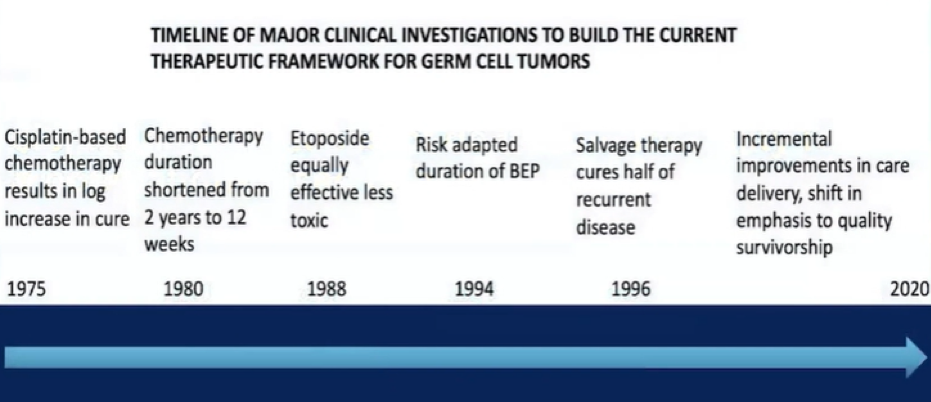(UroToday.com) Following two presentations examining long-term outcomes for patients with testicular cancer in the Prostate, Testicular, and Penile Oral Abstract session at the 2021 American Society of Clinical Oncology (ASCO) Annual Meeting, Dr. Daneshmand summarized these data and considered both the good and bad that has accompanied the progress made in testis cancer over the past decades.
He began with a discussion of abstract 5506, assessing causes of death among patients treated for testicular cancer in the cisplatin era. He began by highlighting the improvements in germ cell treatment over the past 45 years.

Relying on data from the Cancer Registry of Norway, the authors showed that there was 23% excess non-testis cancer mortality for testis cancer survivors, compared to the general population. This was not identified among patients who were treated with surgery alone (SMR 0.95) but was significantly elevated among those who received either chemotherapy (SMR 1.23) and radiotherapy (SMR 1.28).
Further, Dr. Daneshmand highlighted that the standardized mortality rate increased with increasing time since diagnosis and that the most important causes of death were non-testis cancer secondary malignancies. Further, there was an observed increase in suicide deaths among those who received chemotherapy. Additionally, the increased risk in non-testis cancer mortality for those undergoing chemotherapy emerged when patients received four or more cycles of therapy.
Thus, Dr. Daneshmand emphasized that we should avoid chemotherapy for patients with testis cancer when this is possible. Thus, for those with stage I disease, we should offer surveillance. For those with stage IIA/B disease, we should consider primary retroperitoneal lymph node dissection. Finally, for those with stage IIB/C disease, we should consider a risk-stratified use of 3 or 4 cycles of chemotherapy with or without post-chemotherapy RPLND.
Moving forward, the future of testis cancer management will likely, in his view, be transformed by use of miRNA-371.

The use of miRNA-371 may allow for a risk adapted approach, as suggested in the proposed study design highlighted below. This approach takes into account conventional characteristics including imaging details and routine tumor markers in addition to miRNA-371 to guide care.

Next, Dr. Daneshmand considered abstract 5007, discussing the management of late relapses of germ cell tumors from the Indiana University cohort. He noted that surgery is the most important treatment modality in these patients with salvage chemotherapy being generally ineffective.
Dr. Daneshmand emphasized that the timing of late relapse is quite variable (ranging from 2 to 43 years following initial diagnosis, with a median of 7 to 10 years. The majority of these patients present symptomatically, while 28 to 40% of patients are identified on the basis of elevated markers or radiographic abnormalities. A large proportion of these late relapses are histologically teratoma (60%) with sarcomas and adenocarcinomas representing a relatively small proportion (3 to 23%). The majority of patients present with retroperitoneal disease.
Dr. Daneshmand emphasized that surgical resection of all recurrent sites is critical for cure and most late relapses are chemotherapy-resistant. Further, patients who have completely resected disease and normalization of tumor markers are unlikely to benefit from further adjuvant chemotherapy. However, based on the data from Indiana University presented at this meeting, he highlighted that patients with chemotherapy-naïve late relapse are much more likely to have chemotherapy sensitive biology.
While Dr. Richardson suggested that patients with germ cell tumors require lifetime follow-up, Dr. Daneshmand emphasized that late recurrence is a rare event (1.5 to 3%) and so, while a prolonged period of surveillance is warranted, it is equally important to educate patients about the signs and symptoms of recurrence.
In closing, he concluded that, while late toxicities are significant, better delineating these offer opportunities to improve care and improve late effect profiles. Further, while late relapse is associated with an unfavourable prognosis, treatment in expert centers offers the potential for cure in a substantial number of patients.
Presented by: Siamak Daneshmand, MD, Associated Professor of Urology, Director of Clinical Research, Keck School of Medicine of USC, University of Southern California, Los Angeles, CA
Written by: Christopher J.D. Wallis, MD, Ph.D., Urologic Oncology Fellow, Vanderbilt University Medical Center, Twitter: @WallisCJD at the 2021 American Society of Clinical Oncology (ASCO) Annual Meeting #ASCO21, June, 4-8, 2021


